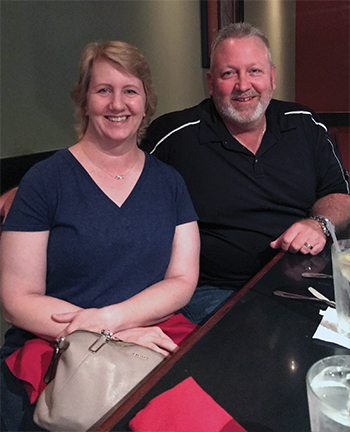HER2+ Breast Cancer Survivor
Sometimes the Best Medicine Is Helping Others
 Kim Scheidt learned she had HER2+ early-stage breast cancer when she was 47 years old. With no previous knowledge of this unique disease before being diagnosed, she quickly learned more about it from her medical team and other survivors. She credits her family and friends, along with online HER2+ support groups, with giving her the strength to successfully manage treatment and survivorship.
Kim Scheidt learned she had HER2+ early-stage breast cancer when she was 47 years old. With no previous knowledge of this unique disease before being diagnosed, she quickly learned more about it from her medical team and other survivors. She credits her family and friends, along with online HER2+ support groups, with giving her the strength to successfully manage treatment and survivorship.
I found the tumor myself one evening when I was cooking. I had an itch, and when I scratched it, I felt the lump. It didn’t move at all, and when I lay down, I could see some retraction in part of my nipple. In my gut, I knew it was cancer. I got on the phone the next day to make an appointment with my general practitioner (GP).
My GP ordered a mammogram followed by an ultrasound then a biopsy. I learned I was HER2+ a few days later when I got the official diagnosis of invasive ductal carcinoma (IDC), Stage IIA, Grade 2, triple positive breast cancer.
I had never heard of HER2. My breast surgeon explained it and told me what it would mean for treatment. I also had BRCA testing but I don’t carry the gene.
My treatment protocol consisted of four chemotherapy drugs. I had six infusions of them every three weeks. After the first six infusions, two of the drugs were dropped. Every three weeks for the remainder of what would be a full calendar year, I continued the infusions with the two drugs that targeted the HER2 protein.
I was able to fit the treatments into my everyday life. I would go for infusions on Thursdays and go back to the center the next day for hydration and a shot to help prevent infection because my immune system was compromised. I’d rest for the remainder of the weekend and go back to work on Monday. I’m an aesthetician. When I greet clients, I need to be happy and positive, always on top of my game. That was a challenge, but my husband and my mother were very supportive and helpful. Our children were older, fortunately, so I didn’t have to run around after little ones.
I am currently on maintenance therapy and will be for seven to 10 years. I’m also on extended adjuvant therapy that further attacks the HER2 protein. I will take that for a year.
Without a doubt, my biggest source of support has been my family and friends. For that, I am grateful beyond words. Prayer is also a big part of my dealing with the physical and emotional side effects of treatment.
The treatment made me tired. It also gave me muscle fatigue, so my oncologist suggested supplements for muscle recovery. And I feel so much better when I get regular exercise. Making sure I get enough sleep is very important, too. The great part is that these two things that help me physically also benefit me emotionally.
By far, the most challenging side effect was the taste change. Nothing tasted good because the chemo wiped out my taste buds, and the texture of food felt different. Even water – and I am a big water drinker – didn’t taste good. Using a straw helped with that. I ate a lot of things like gelatin, pudding, ice cream, smoothies, chicken noodle soup and applesauce. I also drank a lot of nutritional drinks. They gave me the nutrition I needed to have some energy.
I belong to a few Facebook support groups, one specifically for HER2+ and another for the extended adjuvant therapy drug. The ladies in these groups are wonderful. They’ve educated me with the information they offer. While I am sorry for anyone who has to go through this, it helps to know I am not alone. I’ve also found it helps me to help others who are just starting their journey by supporting and educating them. Sometimes the best medicine is helping others.
To anyone faced with this diagnosis, my advice is to breathe! Let the process happen. Do not get ahead of yourself; go one second at a time, if that’s what it takes. Let others help. Be kind to yourself, and listen to your body.


